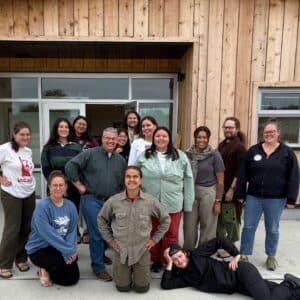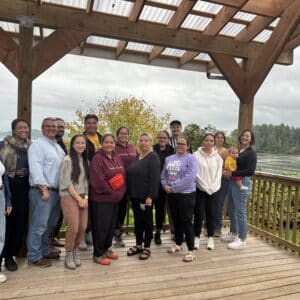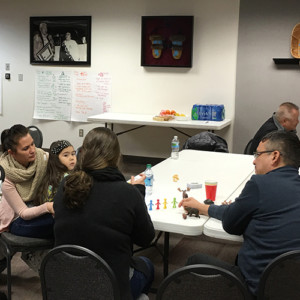As we’ve mentioned before, you take the first, most critical step in revitalizing a language (or achieving any goal) by holding a regular space for conversation. The first night of the Squamish Language Team Orientation went so well that they immediately decided on a weekly night to meet. This was incredibly important. See video from that night.
If you look at the flyer Dustin Rivers designed above (we’ve changed the address for privacy reasons), you’ll see some of the critical elements of a strong language conversation night, and some new examples of how to apply WAYK techniques.
First, technique: “Do Food!“(and “Set-up“). Either the host (ideally) puts out a delicious spread, or you can make the event a potluck, but one way or another a table full of food in the corner vitalizes the learning environment. It may seem like a small thing, but do whatever you need to do to make food available. It will make a remarkable difference.
Second, the repeating weekly evening time, the 3-4 hour length of the conversation night, and opening it up on a drop-in basis all make it possible for many people to come who may have otherwise had scheduling problems. Community organizing in a modern setting can be like herding cats. The regular timing of the night makes it possible for people to plan their lives around it, or drop in when they can (techniques: “same conversation“, “same rotation“). Because of the flexibility of the WAYK game, it really doesn’t matter when people arrive or leave. The game thrives on rolling arrivals and departures.
Third, as much as you can, start with your community first. Start with your neighbors, family, and members of your culture, and make it a space for them to belong in, first (techniques: “start at the beginning“, “limit“). Much later, after you have a very strong language community, you can host more outsiders and members of other cultures, but if you do this too much too soon the language will quickly begin to acquire unusual new dialects. These dialects form when people with other values and worldviews use your language without sufficiently strong guidance from a core traditional language community.
To clarify, if members of your larger community traditionally speak a different dialect of your language, absolutely invite them too, especially if they are confronted with the same language endangerment as you. Though their dialect may differ from yours, it will categorically strengthen both of your languages to learn to speak each others’. Later on, you can focus on helping them with their dialect (or once they feel confident they can apply technique “Copy-cat” and start their own night too!).
There are more factors that will increase the effectiveness of the conversation night and taking that first step, but the beginning ones above far outweigh any others in terms of importance. Just get started. That matters the most.

Technique: “Copy-cat”






[…] a weekly Chinuk Wawa potluck and conversation night, Wednesdays from 4pm to 8pm. Much like with the Squamish conversation night at Dustin Rivers’ house, speakers and WAYK players are invited to drop in and play whenever, and however long, they wish. […]
[…] a weekly Chinuk Wawa potluck and conversation night, Wednesdays from 4pm to 8pm. Much like with the Squamish conversation night at Dustin Rivers’ house, speakers and WAYK players are invited to drop in and play whenever, and however long, they wish. […]